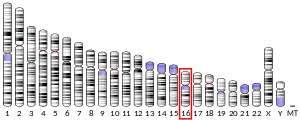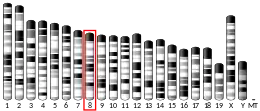HSF4
Heat shock factor protein 4 is a protein that in humans is encoded by the HSF4 gene.[5][6][7][8]
Heat-shock transcription factors (HSFs) activate heat-shock response genes under conditions of heat or other stresses. HSF4 lacks the carboxyl-terminal hydrophobic repeat which is shared among all vertebrate HSFs and has been suggested to be involved in the negative regulation of DNA binding activity. Two alternatively spliced transcripts encoding distinct isoforms and possessing different transcriptional activity have been described.[8]
See also
References
- GRCh38: Ensembl release 89: ENSG00000102878 - Ensembl, May 2017
- GRCm38: Ensembl release 89: ENSMUSG00000033249 - Ensembl, May 2017
- "Human PubMed Reference:". National Center for Biotechnology Information, U.S. National Library of Medicine.
- "Mouse PubMed Reference:". National Center for Biotechnology Information, U.S. National Library of Medicine.
- Nakai A, Tanabe M, Kawazoe Y, Inazawa J, Morimoto RI, Nagata K (Jan 1997). "HSF4, a new member of the human heat shock factor family which lacks properties of a transcriptional activator". Mol Cell Biol. 17 (1): 469–81. doi:10.1128/mcb.17.1.469. PMC 231772. PMID 8972228.
- Tanabe M, Sasai N, Nagata K, Liu XD, Liu PC, Thiele DJ, Nakai A (Nov 1999). "The mammalian HSF4 gene generates both an activator and a repressor of heat shock genes by alternative splicing". J Biol Chem. 274 (39): 27845–56. doi:10.1074/jbc.274.39.27845. PMID 10488131.
- Bu L, Jin Y, Shi Y, Chu R, Ban A, Eiberg H, Andres L, Jiang H, Zheng G, Qian M, Cui B, Xia Y, Liu J, Hu L, Zhao G, Hayden MR, Kong X (Jun 2002). "Mutant DNA-binding domain of HSF4 is associated with autosomal dominant lamellar and Marner cataract". Nat Genet. 31 (3): 276–8. doi:10.1038/ng921. PMID 12089525. S2CID 27368940.
- "Entrez Gene: HSF4 heat shock transcription factor 4".
Further reading
- Maruyama K, Sugano S (1994). "Oligo-capping: a simple method to replace the cap structure of eukaryotic mRNAs with oligoribonucleotides". Gene. 138 (1–2): 171–4. doi:10.1016/0378-1119(94)90802-8. PMID 8125298.
- Suzuki Y, Yoshitomo-Nakagawa K, Maruyama K, et al. (1997). "Construction and characterization of a full length-enriched and a 5'-end-enriched cDNA library". Gene. 200 (1–2): 149–56. doi:10.1016/S0378-1119(97)00411-3. PMID 9373149.
- Dias Neto E, Correa RG, Verjovski-Almeida S, et al. (2000). "Shotgun sequencing of the human transcriptome with ORF expressed sequence tags". Proc. Natl. Acad. Sci. U.S.A. 97 (7): 3491–6. Bibcode:2000PNAS...97.3491D. doi:10.1073/pnas.97.7.3491. PMC 16267. PMID 10737800.
- Smaoui N, Beltaief O, BenHamed S, et al. (2004). "A homozygous splice mutation in the HSF4 gene is associated with an autosomal recessive congenital cataract". Invest. Ophthalmol. Vis. Sci. 45 (8): 2716–21. doi:10.1167/iovs.03-1370. PMID 15277496.
- Somasundaram T, Bhat SP (2004). "Developmentally dictated expression of heat shock factors: exclusive expression of HSF4 in the postnatal lens and its specific interaction with alphaB-crystallin heat shock promoter". J. Biol. Chem. 279 (43): 44497–503. doi:10.1074/jbc.M405813200. PMID 15308659.
- Forshew T, Johnson CA, Khaliq S, et al. (2005). "Locus heterogeneity in autosomal recessive congenital cataracts: linkage to 9q and germline HSF4 mutations". Hum. Genet. 117 (5): 452–9. doi:10.1007/s00439-005-1309-9. PMID 15959809. S2CID 21135251.
- Oh JH, Yang JO, Hahn Y, et al. (2006). "Transcriptome analysis of human gastric cancer". Mamm. Genome. 16 (12): 942–54. doi:10.1007/s00335-005-0075-2. PMID 16341674. S2CID 69278.
- Kimura K, Wakamatsu A, Suzuki Y, et al. (2006). "Diversification of transcriptional modulation: large-scale identification and characterization of putative alternative promoters of human genes". Genome Res. 16 (1): 55–65. doi:10.1101/gr.4039406. PMC 1356129. PMID 16344560.
- Tu N, Hu Y, Mivechi NF (2006). "Heat shock transcription factor (Hsf)-4b recruits Brg1 during the G1 phase of the cell cycle and regulates the expression of heat shock proteins". J. Cell. Biochem. 98 (6): 1528–42. doi:10.1002/jcb.20865. PMID 16552721. S2CID 36553127.
- Ke T, Wang QK, Ji B, et al. (2006). "Novel HSF4 mutation causes congenital total white cataract in a Chinese family". Am. J. Ophthalmol. 142 (2): 298–303. doi:10.1016/j.ajo.2006.03.056. PMID 16876512.
External links
- HSF4+protein,+human at the U.S. National Library of Medicine Medical Subject Headings (MeSH)
This article incorporates text from the United States National Library of Medicine, which is in the public domain.
This article is issued from Wikipedia. The text is licensed under Creative Commons - Attribution - Sharealike. Additional terms may apply for the media files.




